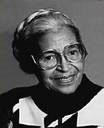 |
| Photo from: www.askjeeves.com |
My hero is Rosa Parks. Rosa was born James and Leona McCauley on February 4, 1913. She is the person who refused to give up her seat on a bus in 1955. Right now she lives in Alabama. She lived in the times where black people were being treated unfairly and is still alive today. Also, she is important to me because she stood up for herself on the bus. She’s made a difference in my life by making me stand up for myself.
Rosa Parks was not the first to be detained for refusal. Blacks met with this girl to determine if she would make a good test case but it was decided that a more "upstanding" candidate was necessary to withstand the scrutiny of the courts and the press. And then in October, a young woman named Mary Louise Smith was arrested; N.A.A.C.P. leaders rejected her too as their vehicle, looking for someone more able to withstand media scrutiny. Smith paid the fine and was released.
Six weeks later, it happened. These are the facts : On Dec. 1, 1955, Mrs. Rosa Parks, seamstress for the Montgomery Fair department store, boarded the Cleveland Avenue bus. She took a seat in the fifth row — the first row of the "Colored Section." The driver was the same one who had put her off a bus 12 years earlier for refusing to get off and get back on through the back door. Had her work in the N.A.A.C.P. sharpened her sensibilities so that she knew what to do — or more precisely, what not to do: Don't frown, don't struggle, don't shout, don't pay the fine?
She was arrested on a Thursday; bail was posted by Clifford Durr, the white lawyer whose wife had hired Parks as a seamstress. That evening, after talking it over with her mother and husband, Rosa Parks agreed to challenge Montgomery's segregation laws. During a midnight meeting of the Women's Political Council, 35,000 handbills were made for distribution to all black schools the next morning.
The trial lasted 30 min., with the expected conviction and penalty. That afternoon, the Montgomery Improvement Association was formed. So as not to ruffle any activists' feathers, the members elected as their president a relative newcomer to Montgomery. The Rev. Martin Luther King Jr. That evening, addressing a crowd gathered at the Holt Street Baptist Church, King declared in that boisterous, ringing voice millions the world over would soon thrill to: "There comes a time that people get tired." When he was finished, Parks stood up so the audience could see her. She did not speak; there was no need to. Here I am, her silence said, among you. Soon after, she was released.
Page created on 7/3/2004 12:00:00 AM
Last edited 7/3/2004 12:00:00 AM
